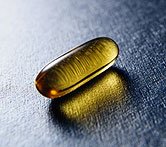- 8 Ways to Increase Dopamine Naturally
- 7 Best Breads for Maintaining Stable Blood Sugar
- Gelatin vs. Collagen: Which is Best for Skin, Nails, and Joints?
- The Long-Term Effects of Daily Turmeric Supplements on Liver Health
- Could Your Grocery Store Meat Be Causing Recurring UTIs?
- Are You Making This Expensive Thermostat Error This Winter?
- Recognizing the Signs of Hypothyroidism
- 10 Strategies to Overcome Insomnia
- Could Artificial Sweeteners Be Aging the Brain Faster?
- Techniques for Soothing Your Nervous System
Study: Vitamin D Supplements May Not Raise Risk for Kidney Stones


THURSDAY, Oct. 17If fear of kidney stones is preventing you from using vitamin D supplements, a new study could ease your mind.
Taking vitamin D does not increase the risk for kidney stones, the study found. People’s age, gender and weight, however, may play a role in developing the condition.
Previous research suggested that adequate levels of vitamin D might help protect against a number of diseases, including certain forms of cancer.
“Our results may lessen concerns by individuals about taking vitamin D supplements, as no link was shown between such supplementation and an increased risk for kidney stones,” study leader Cedric Garland, of the University of California, San Diego School of Medicine, said in a university news release.
The new study used data on more than 2,000 adults of all ages. After following the participants for 19 months, researchers found that only 13 people reported being diagnosed with a kidney stone during that time.
The study, which appears Oct. 17 in the American Journal of Public Health, did show that being older or having a higher body-mass index (BMI) were both risk factors for this condition. BMI is a measurement of body fat based on height and weight.
Men also are at greater risk for kidney stones than women, the study found. But vitamin D users are not, it suggested.
“Mounting evidence indicates that a vitamin D serum level in the therapeutic range of 40 to 50 [nanograms per milliliter] is needed for substantial reduction in risk of many diseases, including breast and colorectal cancer,” said Garland, an adjunct professor with the division of epidemiology in the department of family and preventive medicine.
Garland added that supplements typically are needed to achieve this blood level of vitamin D. People with a higher BMI need more vitamin D to gain its health benefits, he said.
More information
The U.S. Office of Dietary Supplements has more about vitamin D.
Source: HealthDay
Copyright © 2026 HealthDay. All rights reserved.










